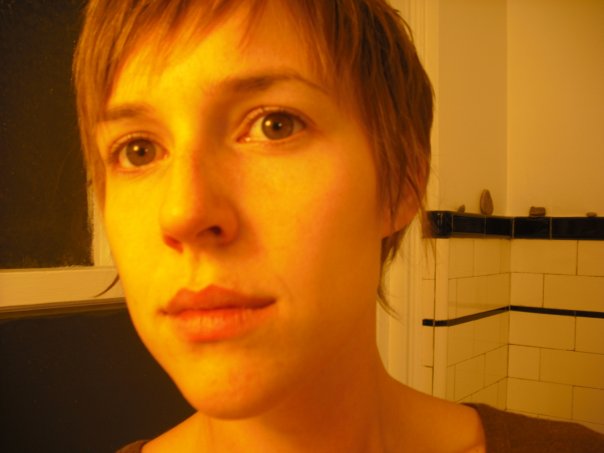Where can we go now, motherfucker?: An Interview with A. Minetta Gould

A. Minetta Gould was raised in the mittens by a beautician. She’s since transplanted herself to the West where she worries herself with rust, the epic, and pagination. She’s the managing editor for Black Ocean and edits the journal Lonesome Fowl. She is the author of two recent chapbooks: Arousing Notoriety (Publishing Genius, 2011) and Dutch Baby Combo / The Boys are Talking about Restlessness at Five-Points (Spooky Girlfriend Press, 2011).
Nathan Logan: I first remember encountering your work in elimae, and then in the fifth issue of Caketrain. Your poems seemed strange in the best kind of way—in both issues, no other poets seemed to be up to what you were doing. It is a hard feeling/observation to quantify. Do you see yourself as writing in/out of some tradition—do you get your cues from any specific poets or schools of thought?
A Minetta Gould: I think the poems you saw in elimae and Caketrain work outside any poetic tradition for a very simple reason: I didn’t know anything about poetry, really. I started writing poems when I was 20 or 21, and I started publishing when I was 21 or 22, and I hadn’t yet realized how to examine the tradition. I was influenced by play, by being anything but the tradition, and had no desire inside myself to learn about it. The first books of poems I read were by kids—people who were maybe 25-30—from small presses. The first books I can remember buying are Jason Bredle’s A 12 Step Guide (whoever has that please give it back) and Laura Glenum’s Hounds of No (which also is no longer in my possession). I had no clue what was going on in those books, but I knew I liked it, and knew I wanted to be weird. I didn’t have time for dead white guys, the 1970s, or, heaven forbid, craft studies.
Then I turned 25 in my first year of grad school and realized it’d be super dumb of me to keep fooling myself into thinking weirdness came from ignorance. I started with the big buzz dude’s, the Surrealists, and have worked my way around the scope of what it is I think I may do. At this point in my career (I think I’m referring to an academic career here, not some sort of poetic one) there are several names/traditions that obviously have an influence on my writing: Lyn Hejinian, Mina Loy, Russell Edson, Charles Baudelaire, Paul Celan, etc. I’m intensely interested in the Lyric due to my intense studies with Martin Corless-Smith, and will probably never let those dirty little tricksters of the Surrealist Movement go.
